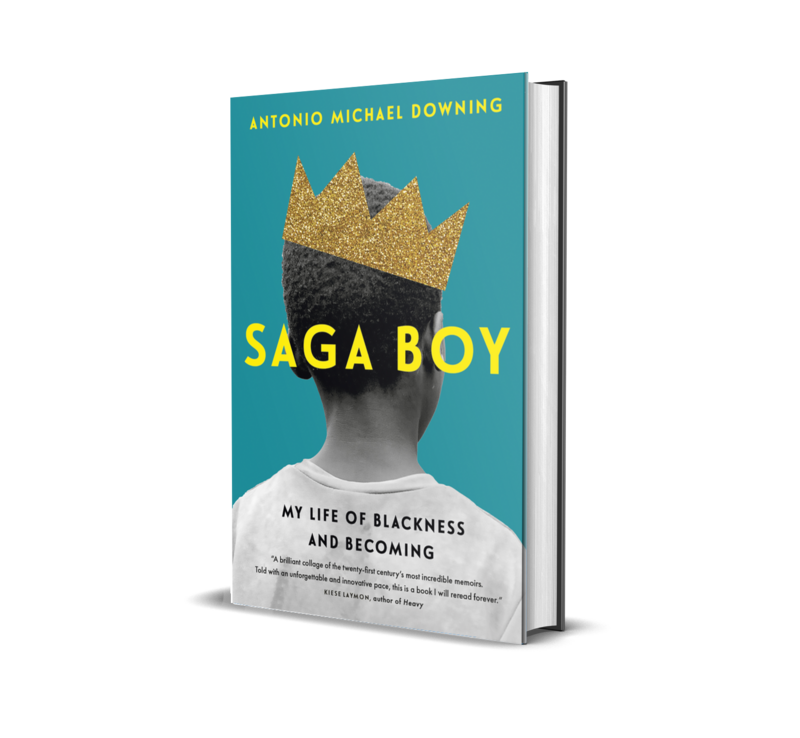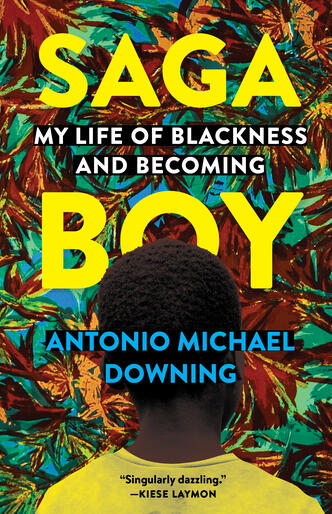Excerpt: Antonio Michael Downing's Saga Boy

What is home? The house you grew up in? Your hometown? Where-ever your family stays?
When I was 11 everything I thought I knew about home and who I was disappeared. I went to sleep in a rainforest and woke up in a blizzard. I moved from Southern Trinidad in the Caribbean Sea to Northern Ontario, Canada. My grandmother Miss Excelly, who was my whole universe, was gone. The way people looked and spoke, the assumptions they made, were all gone. My place in the world was gone. And everything that followed was a mad scramble to find a way back to a sense of belonging.
Saga Boy is my return back to that place. This is a memoir of my scattered family, of colonialism, of childhood trauma, of blackness, of placelessness, and of an old lady’s prayers living far beyond her life. I travelled through North America, shared stages with rock stars, took meetings with tech tycoons, and changed my name many times in pursuit of the elusive sense of arrival. And there is still a little boy inside me. He is still in the jungle, running through the bush, singing her songs, with a guava wood scepter and a hibiscus crown. This book is the alchemy of his experience. The saga of a boy returning home.
—Antonio Michael Downing, author of Saga Boy: My Life of Blackness and Becoming
EXCERPT
Chapter One
MONKEYTOWN
I
Poulourie was my everything.
Pou-lour-ree. These three delicious syllables ruled my life. I was five, and if I ever got my hands on as little as fifteen cents, I would buy poulourie, a fluffy, golden deep-fried ball of dough that was crunchy on the outside and chewy on the inside. I lived in New Grant, a village in the south of Trinidad—or “down South,” as we would say. It sat between wide, muddy rivers full of crocodiles, thick tropical wilderness, and fields upon fields of sugar cane. The yellow-and- brown two-storey building where we learned was called New Grant Anglican School, and it had been established in the year 1900. To the front, there was a paved asphalt area where we played netball, rounders, and hopscotch in our neat uniforms. In the field next to that, we dashed about, made believe, and whenever possible, yelled as loudly as we could.
Next to this field was a small shop of wonders. They sold: pickled red mango, coconut sugar cakes, sticky peppery anchar, and of course, poulourie. It was pretty much neutral in taste, but it was served with spicy mango chutney or sticky sweet tamarind sauce on brown wax paper. Poulourie was my favorite thing.
One day, I had bought three or four and was fixated on inhaling them while waiting to cross the main road. I was straining not to get any chutney on my khaki uniform. Cars roared by while I stood, my mouth wet with wanting. I was captivated by the mesh pattern inside the dough balls, by the heat of the wax paper and the green mango chutney. Just as I looked up, a twenty-seat maxi taxi passenger van dashed right by my nose. My nostrils burned with diesel. A drunk on the other side of the road staggered backwards, his eyes bulging big, like guavas.
“Yuh go get kill one day!”
In Trini, an alcoholic was a “rumbo.” Everybody drank rum, and I knew from the way big people talked that you never listened to a rumbo.
Still, I finished my poulourie, which was never “poulouries” even if you had several, and looked both ways before crossing to my street: Monkeytown Road, Third Branch. Which at this point was the only place in the universe I knew.
II
On a day like that, it would have been normal to hear the sound of Miss Excelly’s voice drifting over the tombstones. There was a cemetery on either side of the street, and ours was the first house after the one on the left. Her voice would catch me as soon as I left the junction, drifting like a breeze.
My grandma—we called her Mama, and everyone else called her Miss Excelly—was always singing. When she woke up with the kiskadees, when she was happy and smiling, when she was thoughtful and laughing to herself, or when she went to bed, the bullfrogs as her backup, she sang. Hymns, mostly. About Jesus and salvation and redemption and power. So basically every single song in the Anglican hymnal. “Power in the Blood,” “How Great Thou Art,” “Rock of Ages,” “Abide with Me,” and the draggy one that was her favourite, “Stars in My Crown” which I didn’t really understand then, except I knew it had something to do with getting “stars in my crown … when at evening the sun goeth down … in the mansions of rest.”
What I did know was that her bright eyes and soft face got very strange when she sang this hymn. She would smile with her whole face but have tears in her eyes. Was it possible to be sad and happy at once?
In those moments coming home from school, the world seemed dim and out of focus. Everything hushed. Her voice perfumed the very air. The tall grass across the cemetery leaned in slow motion. Beads of sweat slid down my forehead and tickled my neck. All of creation became her voice calling me home.


